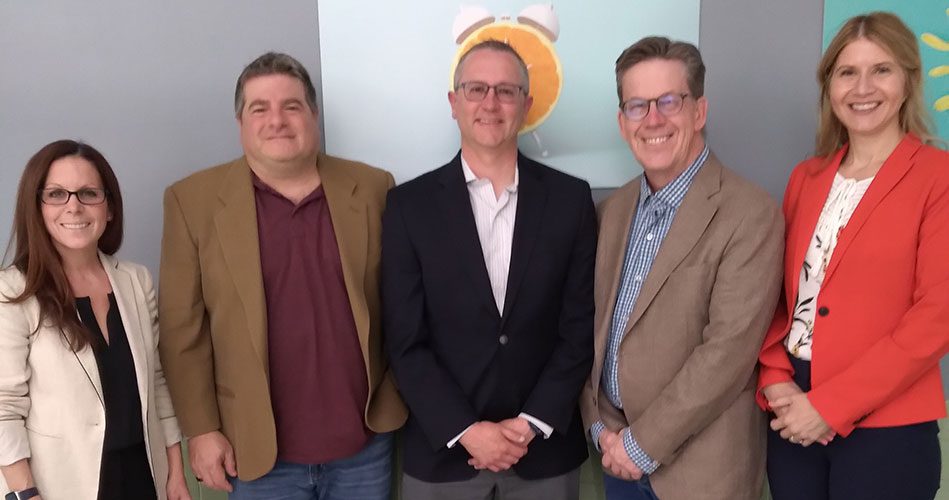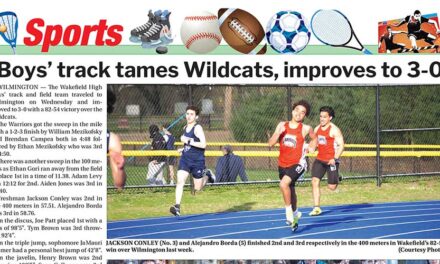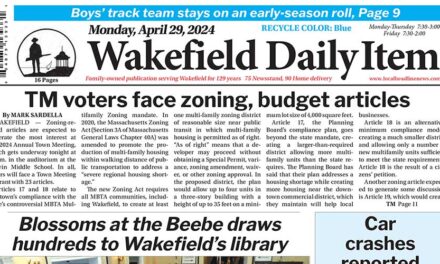
CONSISTENCY in the leadership of the School Committee will continue in the 2023-24 term. From left: Dyana Boutwell, government representative; Jeff Friedman, secretary; Scott Buckley, chair; Rich McGowan, vice chair; and Noelle Rudloff, member. (Neil Zolot Photo)
Collaborative FY24 budgets accepted for Special Ed placements
By NEIL ZOLOT
NORTH READING — School Committee members decided to keep the same officers in the coming year in their post-election reorganization Monday night.
Scott Buckley, who was re-elected to the board for a third consecutive three-year term without opposition in the May 2 election, will remain chair. Rich McGowan continues as vice-chair, Jeff Friedman remains secretary and Dyana Boutwell continues as the government representative.
McGowan nominated Buckley for chair and the subsequent vote was by consensus without a formal roll call vote, as were the others. Member Noelle Rudloff voiced the nominations for the other officers.
“It’s an honor to serve on the School Committee and I appreciate the trust of my fellow members,” Buckley said. “We all have an equal say; the chair just helps keep things moving forward.”
This nomination marks Buckley’s fifth consecutive year as chair. He also served as vice chair during his second year and secretary in his first year.
Special Education collaborative
budgets accepted
In other business, the committee accepted the Fiscal Year 2024 budgets of the Northshore Education Consortium, headquartered in Beverly, and the SEEM Collaborative in Stoneham. (Although not used as a name anymore, SEEM originally stood for Special Education of Education Mutual.)
“They are both extremely valuable,” Buckley said. “It’s important to be able to offer all students access to a robust education and sometimes we’re unable to offer that in the North Reading School District. Programs such as SEEM and Northshore Consortium offer important offerings and our memberships give us discounted rates for those programs. The membership fees are very reasonable and typically, even if a single student attends, the discounts far exceed the cost of the membership.”
Superintendent Dr. Patrick Daly added they offer consultation for English as a Learned Language and counseling programs and information for professional development. “There are lots of good reasons to be on board with them,” he said.
The Consortium’s FY24 budget is $28,570,756, an increase of $981,077 from the FY23 budget of $27,589,679.
SEEM’s FY24 budget is $35,901,773, an increase of $151,093 from the FY23 budget of $35,750,681.
North Reading has three students served by the Consortium and one at SEEM. The local tuition to SEEM for FY24 is $51,840, an increase of 6.27% or $3,060 over the current budget of $48,780. Lynnfield also has one student at SEEM, pays the same tuition and received the same increase over FY23. Reading has six students served by SEEM and that town’s tuition assessment increased by 6.42% ($21,600) from $56,070 per student ($336,420) to $59,670 per student ($358,020).
The Consortium doesn’t pinpoint costs per student or community because the many services they provide are wide ranging in cost, but the FY22 figures they provided with their Fiscal 2024 budget show a budget of $25,773,836 for 484 students, which breaks down to an average of $53,251 per student. Buckley said he appreciated the modesty of the increases especially in light of state-mandated increases in costs to private day and residential schools serving special education students of 14 percent.
SEEM calculates a “member cost avoidance” figure comparing the funds they collect from each community to what tuition would cost at private facilities. It would be $256,550 for North Reading based on private school costs of $75,330 per student. “The savings of cost compared to a private institution is important,” Daly feels.
Tuition paid to the Consortium and SEEM, respectively, are part of the town’s FY24 School Department budget of $37,319,595, which was pared down from $37,768,204 after figuring in additional state aid and cutting some planned positions. Daly is satisfied, but cautious about the figure for the upcoming year and the future.
“We’re making some difficult cuts,” Daly said. “We’re losing some grant money next year, so it will be very challenging. There are some positions we’re concerned about losing next year, but I hope, in the long term, we’ll be able to restore some of those positions.”
“As for challenges in the year ahead, the entire School Committee will discuss our goals this summer,” Buckley added. “I enjoy the opportunity to work collaboratively with Superintendent Daly, and support him as he leads the district.”
Future meeting schedule
In housekeeping business, the committee set a meeting schedule for the upcoming year and will continue to meet on the second and fourth Monday of each month, most often in the Distance Learning Lab at NRHS. The May 8 meeting was held at the L.D. Batchelder School and was one of the yearly visits by the committee to each school. They met at the J. Turner Hood School March 13 and will be visiting the E. Ethel Little School on May 22.





